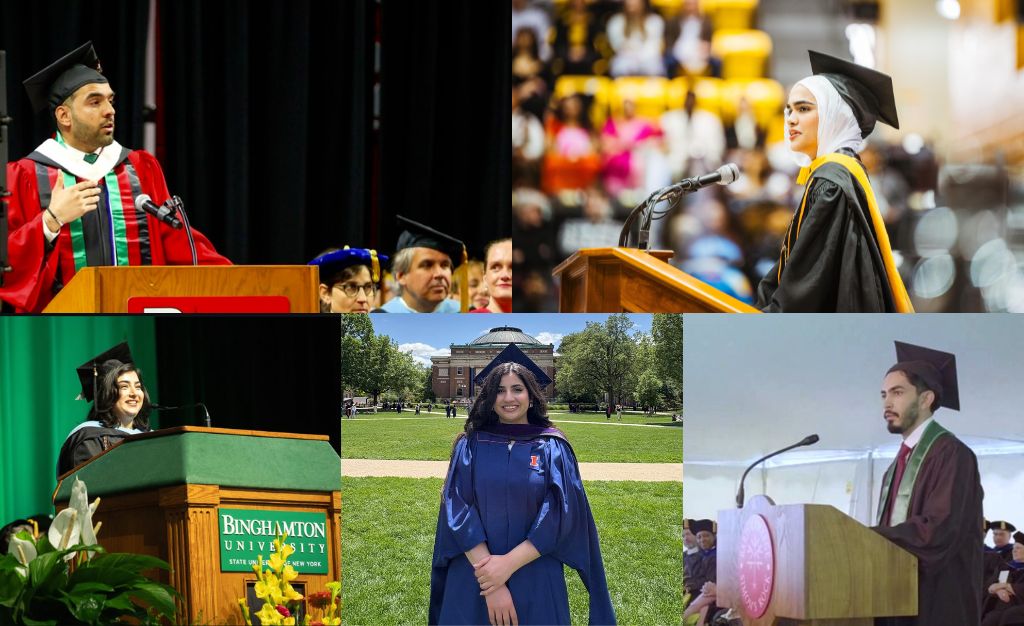Once Facing Uncertainty in Afghanistan, QSAP Scholars Deliver Remarks About Resilience and Community This Spring
Photographed above, starting top left clockwise: Mohammad Yosuf Ayni, Tabasum Hamdard, Sayed Eqbal Srosh, Diyana Sharifi, and Shahdukht Tapesh were selected as student speakers.
IIE is proud to celebrate the Qatar Scholarship for Afghans Project (QSAP) Class of 2025. Ninety-eight QSAP scholars graduated from their universities this year, the largest graduate cohort since the program began in 2022. Recognized for inspiring stories of resilience and positive contributions to campus life, five QSAP scholars—Mohammad Yosuf Ayni, Tabasum Hamdard, Diyana Sharifi, Sayed Eqbal Srosh, and Shahdukht Tapesh—were selected as student speakers at their graduation ceremonies this spring. To celebrate the entire QSAP Class of 2025, IIE hosted a virtual commencement ceremony in June. Speakers included Jason Czyz, President of IIE; Talal Al-Hothal, Director at Education Above All (EAA); Wilson Shirley, Afghan Future Fund (AFF) Board Member; Tim Barnes, Executive Director of Partnerships & Research at the University of Kentucky; Sakhi Ataye, Bard College ’25; and Jonah Kokodyniak, EVP at IIE.
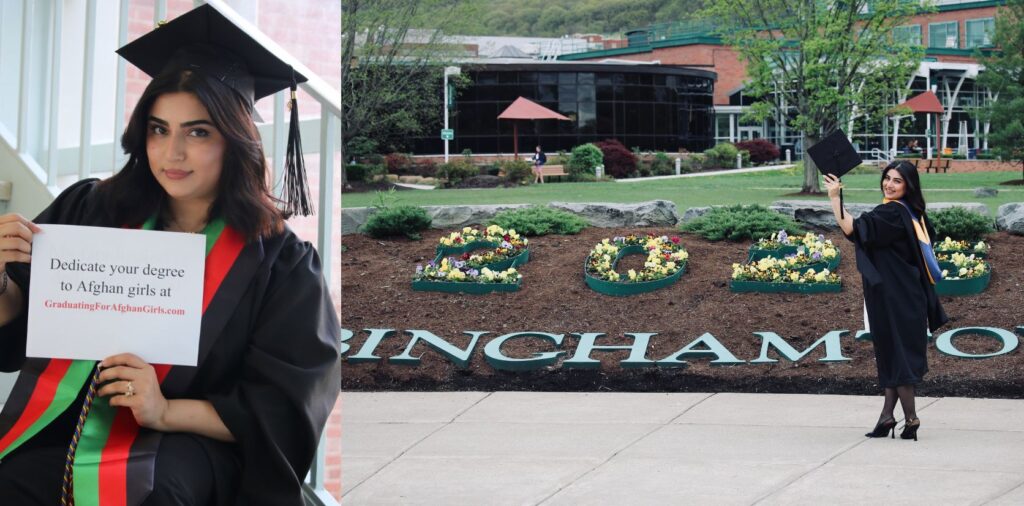
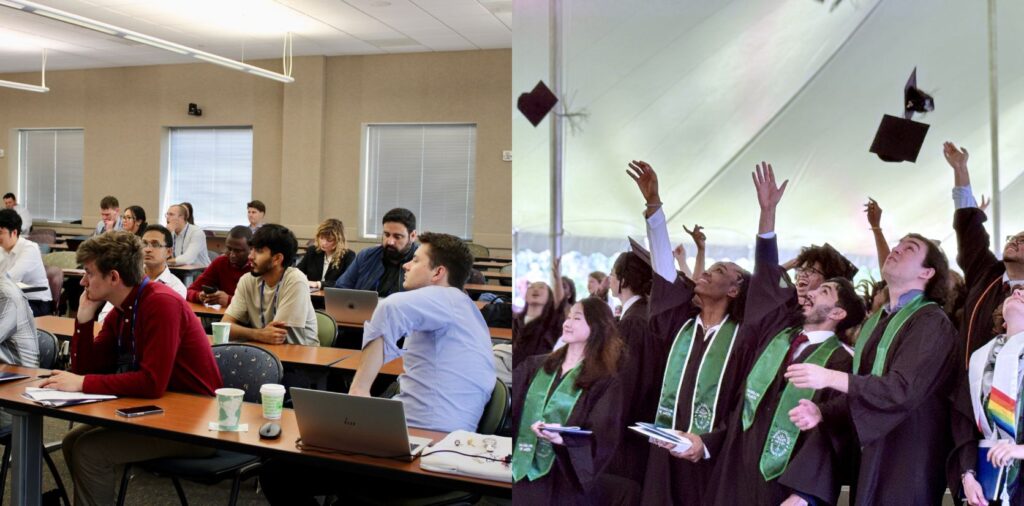
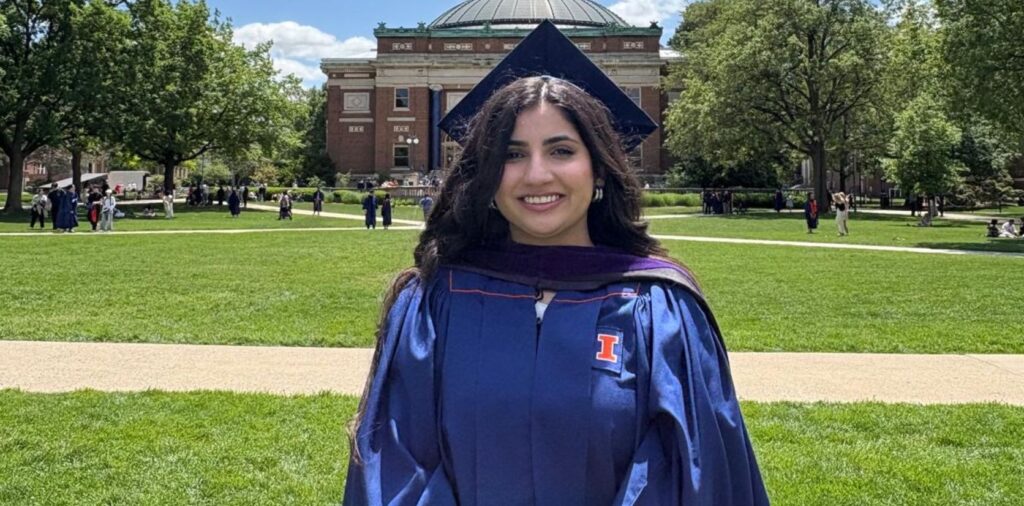
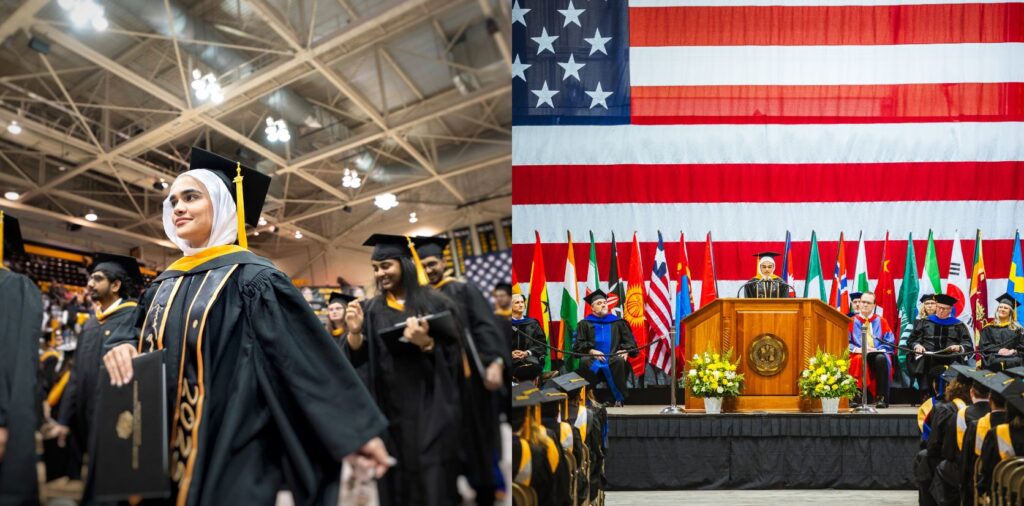
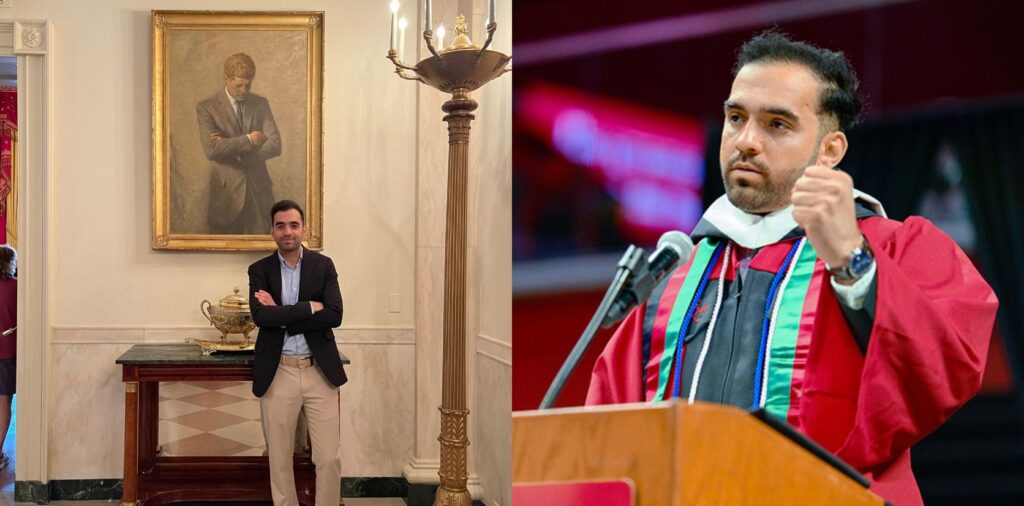
Created to preserve and invest in human capital among displaced Afghan university students, the QSAP program is supported through a collaboration among the Afghan Future Fund (AFF), Education Above All, the Yalda Hakim Foundation, the Institute of International Education (IIE), and the Qatar Fund for Development (QFFD). Scholars receive funds to continue their academic studies outside of Afghanistan.
Below, QSAP scholars reflect on their journeys to advance their education and pay it forward, and share excerpts from their remarks at their respective graduation ceremonies at Bard College at Simon’s Rock, Binghamton University, Michigan Technological University, University of Illinois Urbana-Champaign, and Rutgers University. Reflections have been edited for brevity and clarity.
Mohammad Yosuf Ayni, B.A. in Political Science & International Relations, Rutgers University
Leaving Afghanistan taught me that resilience is transforming pain into purpose—it is having the courage to rebuild your life and to still choose hope. When I learned that I had been selected as a QSAP Scholar, I felt a powerful mix of relief, hope, and validation. After all the uncertainty and loss, I felt seen, not just as a student, but as someone striving to build a new life with purpose.
My education at Rutgers helped me find my voice and understand the power of mentorship, support, and human connection. Being part of QSAP gave me more than academic support; it gave me a community that believed in my potential when I needed it most. I’ve made meaningful connections with other QSAP scholars; we’ve built something meaningful together: a support system grounded in resilience and empathy.
My mission is to create environments where others feel seen, supported, and empowered to thrive. Coming from Afghanistan, I understood early on how deeply governance can impact people’s futures. I chose this path not only to understand systems of power, but to one day enhance them for the benefit of future generations, especially Afghan youth and women, and people who have been displaced around the world.
At Rutgers, I learned that we are not defined by where we come from, but by what we choose to become. I believe our stories can bridge divides, inspire change, and remind others they’re not alone. No matter what challenges you face, your voice has value—and when used with intention, it can move mountains.
Never underestimate the power of your story.”
Mohammad Yosuf Ayni, QSAP Class of 2025
Tabasum Hamdard, M.S. in Data Science, Michigan Technological University
Leaving Afghanistan and putting my MBA on hold wasn’t part of the plan, but I didn’t have time to think about it. I had to act quickly and adapt. When I found out that I had been selected as a QSAP scholar, I was very grateful; the moment felt surreal. The news reminded me that we weren’t alone; someone out there believed in us and was willing to support us. I also felt a strong sense of responsibility. I knew there were thousands of other girls who would have given anything to be in my place. I’ve always felt that I have to make this opportunity count, not only for myself, but also for those who didn’t get the same chance.
Knowing that I can be part of something that actually helps people is what keeps me motivated. Right now, I’m applying what I’ve learned in agriculture and disease modeling. In addition, I organize and host annual WiDS (Women in Data Science) online events to build visibility, confidence, and connection as well as show young women that someone like them made it in the field so they can, too.
There’s comfort in community. Seeing all of us show up again during the online QSAP graduation reminded me that we’re still part of something shared, even if our paths have gone in different directions. Being part of this group makes me feel proud and hopeful for the future of Afghanistan.
My experiences have taught me that letting go of one path doesn’t mean you’re lost; sometimes it’s the only way to make room for something better.”
Tabasum Hamdard, QSAP Class of 2025
Diyana Sharifi, LLM in Corporate Law, Commercial Law, and Trade, University of Illinois Urbana-Champaign
When I left behind my home to pursue my dreams, I finally understood what resilience truly means. It’s about choosing not to give up on yourself, even when the world around you is falling apart. Chasing your dreams often means walking a difficult, uncertain path, but it’s the persistence through those hard moments that shapes who you become.
When I learned I had been selected as a QSAP scholar, I felt a deep sense of happiness and relief. It made me feel seen and supported, and it reminded me that my goals were within reach.
Being a law student at the University of Illinois pushed me out of my comfort zone. I had to quickly adapt to thinking critically, speaking up with confidence, and understanding complex legal reasoning in a new legal culture. I grew more confident in my voice as a legal thinker and future attorney.
Let’s not forget that we are not just graduates. We are advocates. We have learned how to stand up for justice, for fairness, and for those whose voices are not heard. So, wherever we go next—whether it’s a law firm, a nonprofit, or a courtroom—let’s use our knowledge to make a difference. Let’s keep pushing for a world where no one is left behind.”
Diyana Sharifi, QSAP Class of 2025
Sayed Eqbal Srosh, B.A. in Computer Science, Bard College at Simon’s Rock
QSAP wasn’t just a scholarship; it was a second chance at building the future. I’ll never forget the overwhelming relief and excitement I felt as I boarded the plane, knowing that a new chapter was about to begin.
When I arrived at Bard College at Simon’s Rock, I gained a sense of belonging and purpose. I found mentors who genuinely cared, lifelong friends, and a campus where I felt seen and heard. I came to know several QSAP scholars at Bard and across the U.S. Many of us shared parallel experiences: displacement and starting over while pursuing an education. This commonality fostered a meaningful and uplifting support system that offered encouragement, reassurance, and genuine understanding. That spirit of mutual care and shared resilience.
AI can be a powerful tool for expanding access to information in low-resource languages. I see my education as a starting point for service and innovation. I want to build intelligent systems that are both inclusive and secure—tools that support local languages, respect cultural contexts, and protect data integrity. For my thesis, I focused on machine learning and deep learning techniques for analyzing the sentiment of news in Dari, one of Afghanistan’s national languages. Like many low-resource languages, Dari lacks robust AI models or datasets. Automatic translation or sentiment analysis systems can help policymakers, journalists, and NGOs understand public opinion and/or respond to crises in real time. In a country like Afghanistan, this could enable better humanitarian responses or improve access to education and health information.
Throughout my journey, I have learned to value purpose over perfection. Pursuing my aspirations has never been a straight path, but every step has been meaningful.”
Sayed Eqbal Srosh, QSAP Class of 2025
Shahdukht Tapesh, M.S. in Human Rights, Binghamton University
I felt incredibly fortunate to be selected as a QSAP scholar, but that joy was bittersweet, knowing that Afghan girls are now deprived of similar opportunities. Even though I’m far from home, I still carry the hope of one day returning to help rebuild something better. When I delivered my commencement speech, I dedicated my master’s in human rights to all the Afghan girls who have been denied both the right to education and the joy of graduation for the past four years.
As a student, one of the most valuable lessons I learned was how expanding my network could open doors and shape my career path. I was able to reflect deeply and become more self-aware and intentional about my goals. I identified the skills I needed to succeed in the job market and actively used campus resources to develop those skills, graduating equipped and ready to enter the professional world with confidence.
I’m especially committed to addressing the education ban on women and girls in Afghanistan. As someone who has experienced the power of education, I feel a deep responsibility to support those who have been denied that right. I plan to continue developing initiatives like GraduatingForAfghanGirls.com and collaborate with global partners to expand scholarships, create digital learning pathways, and advocate for the restoration of educational access in Afghanistan.
Education is more than a degree—it’s a duty to advocate for those whose voices are silenced.”
Shahdukht Tapesh, QSAP Class of 2025
Supported by the Afghan Future Fund (AFF), Education Above All Foundation (EAA), Qatar Fund For Development (QFFD), and Yalda Hakim Foundation (YHF), the Qatar Scholarship for Afghans Project (QSAP) works to restore educational access for Afghan youth. Since 2021, QSAP has helped approximately 275 displaced Afghan students continue their education at universities in multiple countries.
